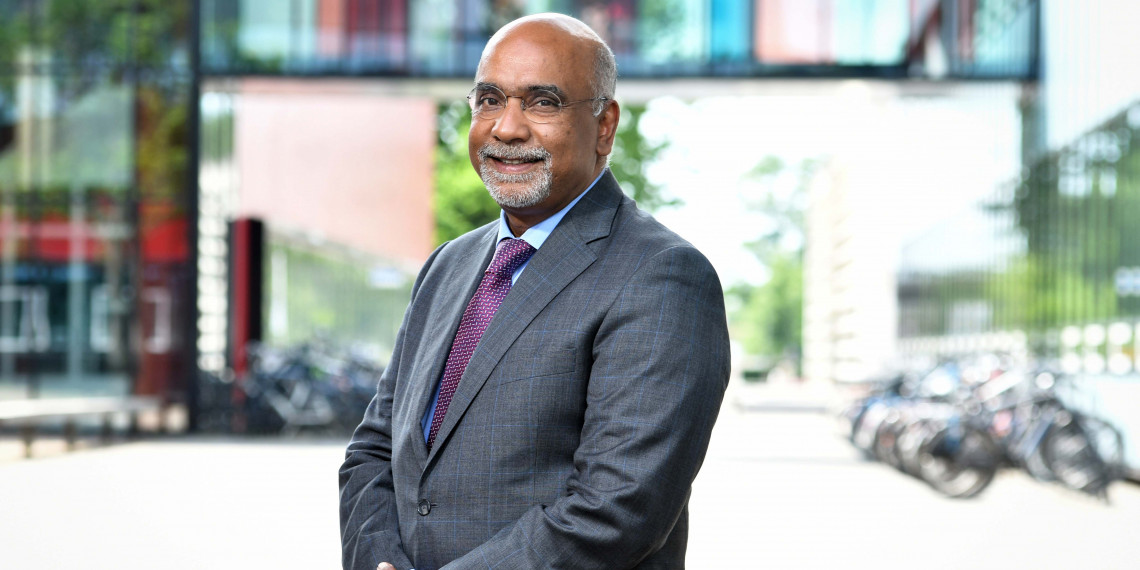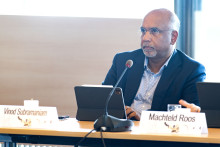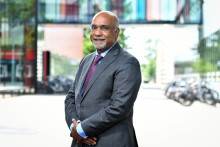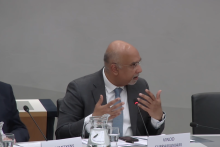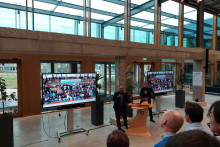‘The victory of Solar Team Twente!’, Subramaniam exclaims when he is asked about his highlight of the last period. This observation is the kick-off for a look back at the first hundred days of his presidency. After eight years of absence, he says he received a warm welcome when he returned to the campus. ‘I really enjoyed the first few months’, he says with an ear-to-ear smile.
Like every conversation these days, the topic of discussion quickly turns to the corona crisis. because this, according to Subramaniam, is the low point of his first hundred days: the ongoing pandemic with all its consequences for the university community. ‘Corona is still our biggest concern. It seems to last forever. There is a limit to the great resilience of students and staff. The elasticity is gone. We all found a way to deal with it, but this is not healthy in the long run.’
How should the university proceed in times of crisis?
‘It is tough. Through time, we have already experienced just about all scenarios. Scripts are on the ready to switch to completely online and to partly physical. Anticipating continuously to changing scenarios creates a lot of work and uncertainty. As the Executive Board, we try to communicate as well and as transparent as we can about this and involve people in it. I am very grateful that physical education and research can continue at this time. That is our primary task, and we do not stand still in that regard.
I think that, in the long term, the epidemiological picture will change as well, although I am not a doctor or an epidemiologist. Our protection rate is constantly increasing, and, in the meantime, science is not standing still. Things are still hazy, and we will have to deal with new waves in the coming years, but I think there will be increasingly more possibilities. However, there is a behavioural component: people are fed up, and unfortunately there is no vaccine for that. That is what makes it difficult.’
'An engineer who has not been able to experiment in a lab or workshop during their education is not a fully-fledged engineer'
The demissionary cabinet may want a corona entry pass with 2G (tested or recovered) for higher education. How does the Executive Board feel about this?
‘We are not in favour of it. Access to education is a fundamental right, and we stand for inclusion rather than exclusion. Some people are not vaccinated for legitimate, medical reasons. Next to that, there are practical objections. There is not a wall around the UT with just one entry gate. At the start of my rectorship at the VU, I sometimes introduced new ideas that made people rightly say: wait a minute, is this feasible? Since then, I have been in favour of the implementation test: policy must be feasible in practice. The corona entry pass seems to not pass that implementation test.’
At the same time, the UT encourages employees and students to take the vaccine…
‘Yes, for sure. I would also say: go for it. The rapid development of vaccines is a triumph for science; it is a major achievement. But in the end, it remains a personal decision to take the vaccine or not. If the alternative to the entry pass is complete online education, things get very complicated. As a technical university, we must offer our students and employees a physical infrastructure. For many programmes, completely online is not an option. An engineer who has not been able to experiment in a lab or workshop during their education is not a fully-fledged engineer.’

As calm and collected Subramaniam talks about the practical and moral reservations of covid passes, that's how vehement he is about the financing of universities. With a raised voice he expresses his dissatisfaction with the funding system and the deficit of 1.1 billion, brought to light by PricewaterhouseCoopers. ‘Yes, the well-known 1.1 billion. That is indeed a problem, that structural underfunding. You know, this is not just about the money. It concerns the entire funding system of universities, which dates back to the Middle Ages. The system has to change.’
In what way?
‘I can talk about it for hours, but I will restrain myself. The system is largely based on market share and is based on completely wrong principles. Suppose we, as the UT say that we do not want to grow, but other universities continue to grow. Then we get less money. How miserable is that? The distribution by market share is the biggest, but not the only perverse incentive. Because the system was designed so long ago and was hardly changed in the meantime, there is no level playing field for all universities. For example, the seniority of institutions is considered, which is a disadvantage for the UT as a young university. Fortunately, the new coalition agreement recognizes this. The predictability of funding is supposed to be increased. Until now, the intake of students was considered; the cabinet wants to get rid of this perverse incentive. The fixed-rate will also be revised and increased, and there will be a better balance between direct and indirect funding. This creates more room to tackle the workload and to offer permanent contracts. That is good news.’
'An ambition must always be thought out: what do you want to achieve and what kind of growth is appropriate? You do not want to grow haphazardly'
What else would you advise the new cabinet when it comes to funding?
‘I already suggested in an interview with the Nederlands Dagblad for the new minister of education – and the entire new cabinet actually – to look at our neighbour to the east. Germany will invest 3.5 per cent of the GDP in education and research. That is the kind of courage you look for in a government. They know that education and research is not a cost, but an investment in a country’s future. Moreover, it is an investment with an incredibly high return. Fortunately, we see in the new coalition agreement that the cabinet wants to heavily invest, although we have to wait and see the elaboration of the plans. But I am hopeful.’
What course should the UT itself take? In an interview with Tubantia, you hinted that the focus should be on quality, not quantity.
‘Naturally, we always go for quality. What I was trying to say, was that unbridled growth is not the ambition of the UT. An ambition must always be thought out: what do you want to achieve and what kind of growth is appropriate? I still remember the time under president of the Executive Board Anne Flierman when the dream was to reach 10 thousand students. That was not reached back then, but now we have more than 12.500 students. But you do not want to grow haphazardly. We must especially look at where the needs lie, from society and the industry. They cry out for engineers, meaning we could grow in a targeted way. But there is a reason we now have to implement a numerus fixus at Technical Computer Science. All over The Netherlands, computer science courses have grown explosively. The problem is not in constructing a building, but in finding people. It is not like we can just open a can of teachers and researchers. Every university is struggling with that.’
'I do not like paper collaborations, we actually have to do things'
Is the devise therefore to seek more collaboration, such as with the Vrije Universiteit?
‘There is a different motivation behind that. Why are you looking for collaboration? If you ask me, it is because we as an institution do not have the capability ourselves to solve major societal problems. You need multiple perspectives for that. Scientists have been operating based on that philosophy for many years – and we can expand on that much more at an institutional level. What I personally find very interesting and important is to not only seek out this collaboration with fellow institutions but also to see what questions are relevant regionally and in society.’
What is important for the Twente region?
‘For me, it concerns young people whom we want to educate. If you talk with people from the industry, you hear that there is a broad need: from well-trained professionals from intermediate vocational education to well-trained academics from university – and everything in between. They need all those smells and flavours and ask for cooperation in teams within that mix. To achieve this, we can seek much more collaboration in this region between ROC, Saxion and UT. And other institutions, such as Roessingh and the MST and ZGT hospitals.’
What should such a collaboration look like?
‘It has to be feasible. I do not like paper collaborations, we actually have to do things. Together you can ensure a broader and bigger impact. No, I do not have concrete plans yet, but I am thinking about collaboration in the field of sustainability, for example. There is drive in this region, I can feel that. And this is also a region where we roll up our sleeves to work. We can create beautiful things here.’
'We can make sure that our work environment feels like the forest of Fontainebleau'
Lastly, we talked about the first hundred days, where do you hope the UT will be in four years?
‘It is rather difficult to come up with concrete examples. Let me put it this way: in four years, the campus must ‘smell’ differently. Sumantra Ghoshal, an Indian scientist, once spoke of ‘the smell of the place’. He talks about his birthplace Calcutta, a place which is very important to him, but also a place where the summer temperatures reach over forty degrees. Such a place sucks all the energy out of your body, Ghoshal knows. He then mentions the town of Fontainebleau in France, where he lived for years. When you take a walk in the forest of Fontainebleau in the Spring, you feel like you have a spring in your step, that is how much energy you get from that environment. According to Ghoshal, that is ‘the smell of place’. When you step into a workplace, you immediately know whether it smells and feels like Calcutta, or like Fontainebleau.’
Does it ‘smell’ bad on campus at the moment?
‘I certainly do not mean to say that the campus ‘smells’ like Calcutta, on the contrary. But we can make sure that our work environment feels like the forest of Fontainebleau. To do this, we must, above all, retain the unique characteristics of the UT, such as the personal approach and the small scale. There is so much beauty here and we should cherish it. But we can do even better. I think that we are at a tipping point. The UT has grown strongly in recent years. The question is whether everything has grown with it. We can work together and professionalize even more. I would like to help create such an environment, where others can develop and want to run and jump, just like in Fontainebleau. But we have to do that together.’



